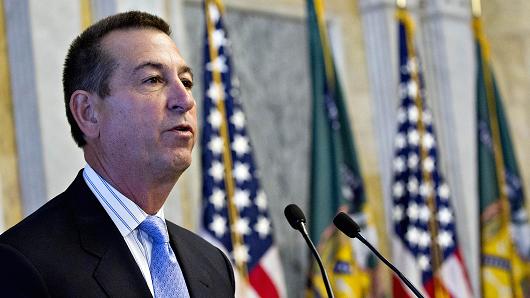
U.S. President Donald Trump’s nominee for Wall Street regulator Comptroller of the Currency bought financial stocks until he took office in November, according to financial disclosure documents filed with the Office of Government Ethics.
While not illegal, the trading activity by Joseph Otting’s money manager could violate the spirit of ethics rules designed to prevent conflicts of interest, five experts in U.S. government ethics standards said.
Nominees are required by law to disclose all assets to the Office of Government Ethics (OGE) and divest any deemed a conflict of interest, or having the appearance of one, once they are confirmed.
Otting gave the OGE a tally of his investments in March 2017 and agreed upon his June nomination to unwind millions of dollars in financial stocks within 90 days of being confirmed.
However, following his nomination Otting bought hundreds more financial shares, according to a Reuters analysis of OGE filings which list some of the stocks along with the number of shares Otting was required to divest upon taking office.
The shares in the newly purchased stocks were together worth at least $160,000 around the time Otting sold them and others in January, based on prices from the date of the Jan. 19 paperwork.
“Mr. Otting divested holdings and has met all other ethical obligations of the office and remains committed to the highest ethical standard,” Office of the Comptroller of the Currency (OCC) spokesman Bryan Hubbard said last week.
As Comptroller of the Currency, Otting is the day-to-day regulator for national banks like Wells Fargo, Bank of America, and JPMorgan Chase Hubbard said Otting’s money manager purchased the shares on his behalf and that Otting is not involved in investment decisions. He said Otting’s manager would continue to trade permitted shares.
Reuters was unable to identify Otting’s money manager.
Nominees may seek a certificate from the OGE that allows them to avoid an immediate tax hit on gains from assets they are required to shed. Otting claimed that right for stocks he had owned for years and stocks he bought in the nearly six months before taking office, according to the certificate filed with the OGE in January.
Some ethics experts said that although the trades were not illegal, purchasing stocks after nomination undermined the integrity of the nomination process.
“Nominees are supposed to shed investments before they take office, not gamble on stocks until the last moment,” said Richard Painter, who served as ethics adviser to President George W. Bush. “If I were handling this, I would have pulled the nomination.”
Painter also questioned Otting’s judgment in seeking a tax deferment on recently bought assets since in his opinion that tool should typically be used to shield nominees from a tax hit on assets they already own, he said.
However, Craig Holman, a government affairs lobbyist at non-profit Public Citizen, noted some ethics officials are reluctant to deem such trading problematic until nominees have been sworn in.
In addition, he said, the rules are not as clear as they should be. “So long as the OGE doesn’t say the activity poses a conflict, then nominees are relatively unconstrained. So their defense is going to be that nobody told them.”
A former career banker and close associate of U.S. Treasury Secretary Steven Mnuchin, Otting is one of several Trump appointees whose ties to industries they regulate have raised questions about their ability to be impartial when enforcing rules.
Otting also sits on the board of the Federal Deposit Insurance Corporation (FDIC), another banking regulator, and is a voting member of the Financial Stability Oversight Council (FSOC). The FSOC, which is led by the U.S. Treasury, monitors a number of non-bank financial companies in order to identify risks to U.S. financial stability.
Since holding stock in companies regulated by the OCC and FDIC-insured companies posed a conflict of interest once Otting took office, he recused himself from general policy and enforcement matters until late January when he sold those and other shares.
The FDIC declined to comment on Friday.
Among Otting’s purchases were 366 shares of KeyCorp, one of the country’s largest lenders directly regulated by the OCC, and 24 shares in Brighthouse Financial, an insurance provider spun off from MetLife.
The bulk of the $160,000 came from the sale of two German stocks, 441 shares of insurer Allianz and 394 shares of stock exchange operator Deutsche Boerse.
The shares in KeyCorp, Brighthouse, Allianz and Deutsche Boerse were not disclosed in Otting’s March filing, or listed as necessary divestments in his June 23 OGE ethics agreement.
FSOC does not oversee Brighthouse, Allianz or Deutsche Boerse but it regulates some of their competitors, according to its website, and helps drive policies that affect sectors in which they operate.
“The Treasury’s ethics office required Otting to divest in stocks that could create a potential conflict of interest with his role on FSOC,” a spokesperson for the Treasury, which also represents the FSOC chair, said on Monday.
KeyCorp, Brighthouse, Deutsche Boerse and Allianz declined to comment on Otting’s share purchases.
